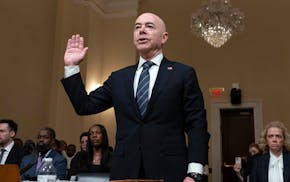WASHINGTON - Underscoring its potential to become a political heavyweight, a new advocacy group launched Friday to push President Obama's second-term agenda will be guided by his most-trusted strategists and have access to his re-election campaign's most-prized assets, including its intricately detailed voter databases.
In an e-mail to supporters, Obama vowed that the group, Organizing for Action, would be "an unparalleled force in American politics." "It will work to turn our shared values into legislative action -- and it'll empower the next generation of leaders in our movement," the president wrote.
Jim Messina, who managed Obama's 2012 campaign, will be the chairman of the board, and longtime Obama adviser David Axelrod will serve as a consultant. David Plouffe, Obama's top political adviser, will also have a role when he leaves the White House, a move expected shortly.
"If we can take the enthusiasm and passion that people showed throughout the campaign and channel it into the work ahead of us, we will be unstoppable," Messina wrote to campaign donors.
To accomplish that, however, the organization must avoid the fate of a previous effort Obama officials made in 2009 to transform his first presidential campaign into a permanent advocacy force. That project was criticized by many Democrats for failing to effectively harness the president's grassroots supporters.
The new group, unlike its predecessor, will be independent of the Democratic National Committee. It is being run by Jon Carson, who directed the White House Office of Public Engagement. Based in Chicago and Washington, the board is stocked with veteran Obama aides Robert Gibbs, Stephanie Cutter, Jennifer O'Malley Dillon, Erik Smith and Julianna Smoot, as well as technology entrepreneur Frank White, a top fundraiser.
Set up as an tax-exempt advocacy group, Organizing for Action will have freer rein to operate, as well as the ability to deploy the sophisticated databases and software developed for Obama's campaign. The campaign will lease those valuable assets to the advocacy group, retaining control for the foreseeable future.
The arrangement gives Obama allies supervision over the campaign's voter files, technology and e-mail lists, which are coveted by other Democratic candidates and interest groups. The decision about how -- and if -- the campaign's infrastructure will be shared is one of the most pressing questions being raised in Democratic circles.
"We've never had a presidential campaign that created and retained the kind of information that the Obama 2012 campaign built," said Democratic strategist Steve Hildebrand. "So it's going to take more than a few weeks to figure ... how it should apply to future elections."
Officials said that the group will accept unlimited individual and corporate donations but not contributions from lobbyists, similar to the self-imposed rules governing the 2013 Presidential Inaugural Committee.
Climate change concerns grow, but few think Biden's climate law will help, AP-NORC poll finds
